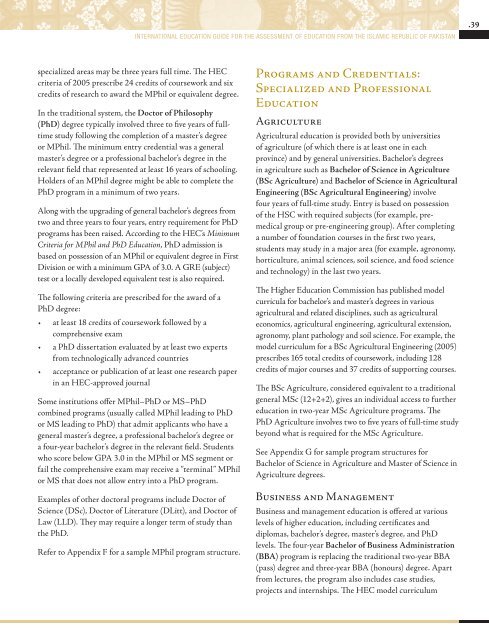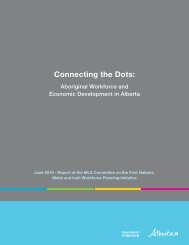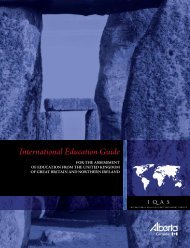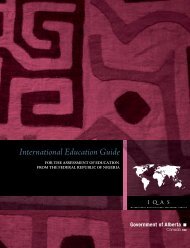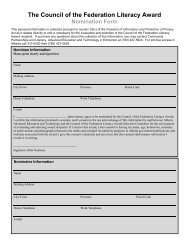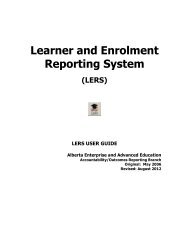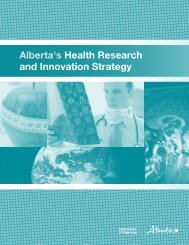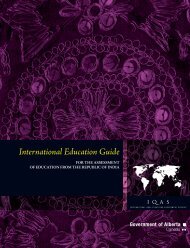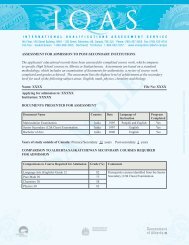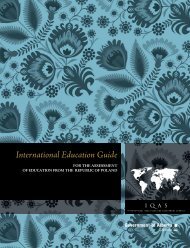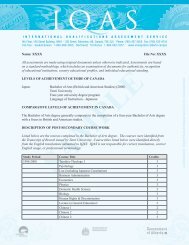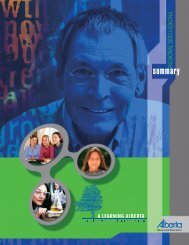International Education Guide - Enterprise and Advanced Education ...
International Education Guide - Enterprise and Advanced Education ...
International Education Guide - Enterprise and Advanced Education ...
Create successful ePaper yourself
Turn your PDF publications into a flip-book with our unique Google optimized e-Paper software.
INTERNATIONAL EDUCATION GUIDE for the assessment of education from the Islamic Republic of Pakistan<br />
.39<br />
specialized areas may be three years full time. The HEC<br />
criteria of 2005 prescribe 24 credits of coursework <strong>and</strong> six<br />
credits of research to award the MPhil or equivalent degree.<br />
In the traditional system, the Doctor of Philosophy<br />
(PhD) degree typically involved three to five years of fulltime<br />
study following the completion of a master’s degree<br />
or MPhil. The minimum entry credential was a general<br />
master’s degree or a professional bachelor’s degree in the<br />
relevant field that represented at least 16 years of schooling.<br />
Holders of an MPhil degree might be able to complete the<br />
PhD program in a minimum of two years.<br />
Along with the upgrading of general bachelor’s degrees from<br />
two <strong>and</strong> three years to four years, entry requirement for PhD<br />
programs has been raised. According to the HEC’s Minimum<br />
Criteria for MPhil <strong>and</strong> PhD <strong>Education</strong>, PhD admission is<br />
based on possession of an MPhil or equivalent degree in First<br />
Division or with a minimum GPA of 3.0. A GRE (subject)<br />
test or a locally developed equivalent test is also required.<br />
The following criteria are prescribed for the award of a<br />
PhD degree:<br />
• at least 18 credits of coursework followed by a<br />
comprehensive exam<br />
• a PhD dissertation evaluated by at least two experts<br />
from technologically advanced countries<br />
• acceptance or publication of at least one research paper<br />
in an HEC-approved journal<br />
Some institutions offer MPhil–PhD or MS–PhD<br />
combined programs (usually called MPhil leading to PhD<br />
or MS leading to PhD) that admit applicants who have a<br />
general master’s degree, a professional bachelor’s degree or<br />
a four-year bachelor’s degree in the relevant field. Students<br />
who score below GPA 3.0 in the MPhil or MS segment or<br />
fail the comprehensive exam may receive a “terminal” MPhil<br />
or MS that does not allow entry into a PhD program.<br />
Examples of other doctoral programs include Doctor of<br />
Science (DSc), Doctor of Literature (DLitt), <strong>and</strong> Doctor of<br />
Law (LLD). They may require a longer term of study than<br />
the PhD.<br />
Refer to Appendix F for a sample MPhil program structure.<br />
Programs <strong>and</strong> Credentials:<br />
Specialized <strong>and</strong> Professional<br />
<strong>Education</strong><br />
Agriculture<br />
Agricultural education is provided both by universities<br />
of agriculture (of which there is at least one in each<br />
province) <strong>and</strong> by general universities. Bachelor’s degrees<br />
in agriculture such as Bachelor of Science in Agriculture<br />
(BSc Agriculture) <strong>and</strong> Bachelor of Science in Agricultural<br />
Engineering (BSc Agricultural Engineering) involve<br />
four years of full-time study. Entry is based on possession<br />
of the HSC with required subjects (for example, premedical<br />
group or pre-engineering group). After completing<br />
a number of foundation courses in the first two years,<br />
students may study in a major area (for example, agronomy,<br />
horticulture, animal sciences, soil science, <strong>and</strong> food science<br />
<strong>and</strong> technology) in the last two years.<br />
The Higher <strong>Education</strong> Commission has published model<br />
curricula for bachelor’s <strong>and</strong> master’s degrees in various<br />
agricultural <strong>and</strong> related disciplines, such as agricultural<br />
economics, agricultural engineering, agricultural extension,<br />
agronomy, plant pathology <strong>and</strong> soil science. For example, the<br />
model curriculum for a BSc Agricultural Engineering (2005)<br />
prescribes 165 total credits of coursework, including 128<br />
credits of major courses <strong>and</strong> 37 credits of supporting courses.<br />
The BSc Agriculture, considered equivalent to a traditional<br />
general MSc (12+2+2), gives an individual access to further<br />
education in two-year MSc Agriculture programs. The<br />
PhD Agriculture involves two to five years of full-time study<br />
beyond what is required for the MSc Agriculture.<br />
See Appendix G for sample program structures for<br />
Bachelor of Science in Agriculture <strong>and</strong> Master of Science in<br />
Agriculture degrees.<br />
Business <strong>and</strong> Management<br />
Business <strong>and</strong> management education is offered at various<br />
levels of higher education, including certificates <strong>and</strong><br />
diplomas, bachelor’s degree, master’s degree, <strong>and</strong> PhD<br />
levels. The four-year Bachelor of Business Administration<br />
(BBA) program is replacing the traditional two-year BBA<br />
(pass) degree <strong>and</strong> three-year BBA (honours) degree. Apart<br />
from lectures, the program also includes case studies,<br />
projects <strong>and</strong> internships. The HEC model curriculum


